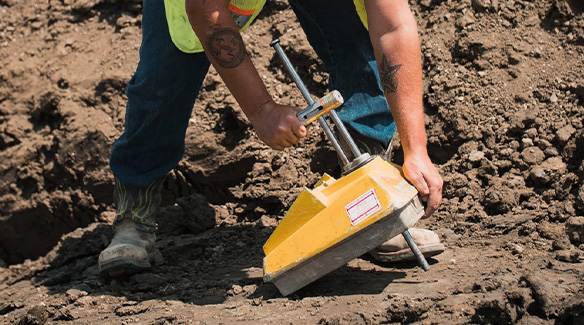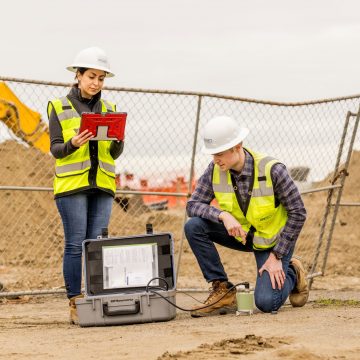Why Employing a Geo Tech Engineer is Critical for Complicated Construction Tasks
Wiki Article
Understanding the Necessary Duty of the Geotechnical Industry in Modern Building Projects and Facilities Growth
The geotechnical industry is a keystone of modern-day building and construction and infrastructure development, offering vital understandings right into soil behavior that straight influence task results. With advanced soil assessments and innovative design remedies, geotechnical professionals not just make sure structural honesty yet also address sustainability worries amid advancing ecological standards.Importance of Soil Assessment
Dirt analysis plays an important function in the geotechnical sector, offering as the foundation for informed decision-making in building projects. Accurate soil examination is essential for determining the viability of a site for different sorts of frameworks, including residential homes, industrial buildings, and bridges. By evaluating soil composition, stamina, density, and dampness content, designers can prepare for possible difficulties and minimize risks linked with ground instability, erosion, and negotiation.The evaluation process generally involves a series of examinations and monitorings that supply essential information about the subsurface conditions. This information educates the layout and building and construction procedures, ensuring that structures are improved solid ground with appropriate support. Understanding the soil profile enables designers to pick ideal construction techniques and materials, maximizing resource application and lessening prices.
Along with making certain structural integrity, soil evaluation adds to environmental sustainability. By identifying prospective contamination or unfavorable effects on surrounding communities, designers can carry out approaches to shield these all-natural resources. Generally, detailed soil analysis is essential in the geotechnical field, underpinning the safety and security, efficiency, and ecological obligation of construction tasks.
Key Geotechnical Methods
A range of essential geotechnical strategies are employed to assess and boost the security and performance of building and construction sites. One fundamental approach is soil tasting and testing, which allows engineers to figure out the physical and chemical residential properties of the ground. This info is essential for making notified choices concerning foundation design and building approaches.One more crucial method is site characterization, which includes the comprehensive analysis of soil and rock conditions via techniques such as borehole boring and in-situ testing. Methods like Standard Penetration Tests (SPT) and Cone Infiltration Examinations (CPT) supply valuable data on dirt strength and stratigraphy.
Ground improvement methods, such as dirt stablizing and grouting, are likewise vital in improving the load-bearing ability of weak dirts. These techniques can mitigate negotiation and boost overall site problems.
Additionally, slope stability evaluation is important for determining potential landslide dangers and making certain the safety and security of excavations. This analysis often employs numerical modeling and limitation equilibrium methods to forecast soil habits under various problems.
Including these geotechnical strategies right into building preparation not just maximizes job outcomes however likewise guarantees the lasting sustainability of framework growth.
Effect On Building Security

Furthermore, reliable geotechnical design involves implementing reduction strategies for identified threats. This might include soil stablizing strategies, keeping structures, or water drainage systems to alleviate hydrostatic pressure. By addressing these factors, building and construction teams can reduce the probability of mishaps and improve worker safety and security.
In addition, continuous surveillance of website conditions is critical during building and construction. Geotechnical tools can supply real-time data relating to ground motion and security, permitting prompt treatments when required.
Essentially, the geotechnical sector plays an essential role in protecting building and construction projects. By prioritizing ground honesty and using strenuous assessment methods, the geotechnical sector not only safeguards the labor tailings engineer force but also contributes to the long life and reliability of created facilities.
Sustainability in Geotechnical Practices

In addition, geotechnical engineers are currently utilizing sophisticated modern technologies, such as geosynthetics, which improve dirt stability while minimizing the quantity of material called for. This not only conserves resources but additionally leads to less waste generation (geotechnical engineers). The combination of lasting design concepts right into geotechnical design motivates making use of renewable energy resources in building and construction procedures, further lowering carbon discharges
By performing these evaluations, geotechnical experts can establish approaches that minimize adverse impacts, making certain conformity with ecological guidelines. Generally, the focus on sustainability within geotechnical methods not only adds to the long life and resilience of facilities however likewise promotes a responsible approach to land and resource management.
Future Trends in Geotechnical Design
Development is driving the future of geotechnical engineering, as emerging methodologies and modern technologies improve the industry. The assimilation of advanced information analytics and fabricated knowledge is readied to revolutionize website investigation and threat evaluation, making it possible for designers to make even more enlightened choices based on real-time data. The usage of geosynthetic materials is obtaining traction, offering sustainable solutions that enhance dirt stability and lower ecological effect - geo tech engineer.An additional considerable pattern is the adoption of automated and robotic systems for tracking and building and construction processes. These modern technologies not only boost precision however also boost security by lessening human involvement in dangerous environments. In addition, the execution of Building Information Modeling (BIM) in geotechnical design helps with enhanced partnership among stakeholders, optimizing job distribution and minimizing expenses.
As climate change postures brand-new difficulties, the sector is significantly concentrating on resilience and versatility in style methods, ensuring framework can endure extreme weather condition events. Ultimately, the continuous trend towards sustainability will drive advancement in environment-friendly materials and methods, straightening geotechnical design with broader ecological goals. Jointly, these patterns will shape a much more efficient, lasting, and durable geotechnical landscape for future projects.
Final Thought

The geotechnical market is a foundation of modern construction and framework growth, giving vital understandings into dirt actions that straight influence task end results. geotechnical engineers.Soil evaluation plays a critical function in the geotechnical industry, offering as the structure for notified decision-making in construction tasks. Overall, comprehensive soil assessment is indispensable in the geotechnical area, underpinning the security, efficiency, and ecological responsibility of building and construction jobs
Building safety is substantially influenced by geotechnical methods, as the security and honesty of the ground directly influence the total safety of a building website.In final thought, the geotechnical sector is important in modern construction and facilities growth, offering critical analyses that ensure structural honesty and security.
Report this wiki page